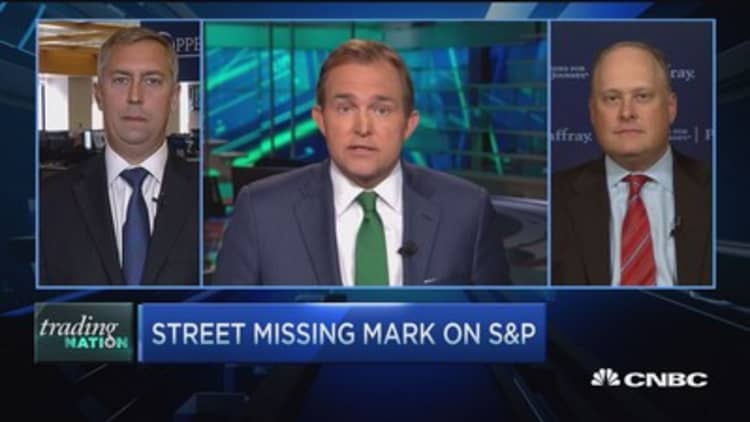
The has fallen 4.5 percent this year, badly underperforming Wall Street expectations. If stocks close the year around this level, it will be the first time that the S&P has missed strategists' targets since 2008.
Major Wall Street strategists began 2015 with a median year-end S&P 500 target of 2,225, which would imply an 8 percent gain for the S&P. None expected stocks to fall in 2015. This followed years in which the S&P rose more than the Street estimated, sometimes powerfully, such as in 2013.
But on Monday, the S&P 500 closed at 1,967, which is rather dramatically below that consensus call.
Andrew Burkly of Oppenheimer points out that the underperformance has come even as one of the key concerns for the market—a presumptive rate rise from the Federal Reserve—has been pushed further and further off.
The most conservative forecasts "were looking for multiples to compress because the Fed would be raising rates," Burkly said Monday on CNBC's "Power Lunch."
That is, strategists expected that earnings would look good, but that investors would pay less for each dollar of earnings (that is, a smaller multiple) due to the higher rates.
"What's interesting is that we didn't get the Fed rate hike. We've gotten a little bit of multiple compression, but it's really on the earnings that most strategists missed their mark," due to continued low energy prices, Burkly said.
Read More Market fear rises after Fed non-move
Not only were strategists too bullish, then, but they were too bullish even though an apparently bearish event that they predicted has not yet come to fruition.
While this might be used as an excuse to mock strategists' inaccuracy, it also shows just how important the price of oil is to the S&P 500, given the energy weighting in the index. And with oil in free fall, the already tough task of predicting where stocks will end the year appears to have gotten even harder.








